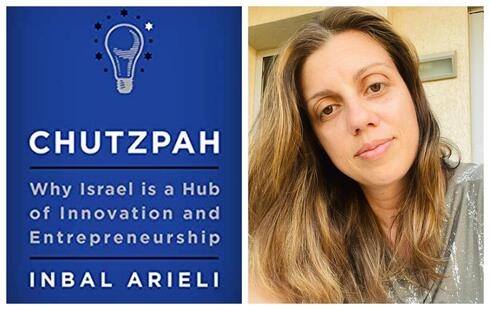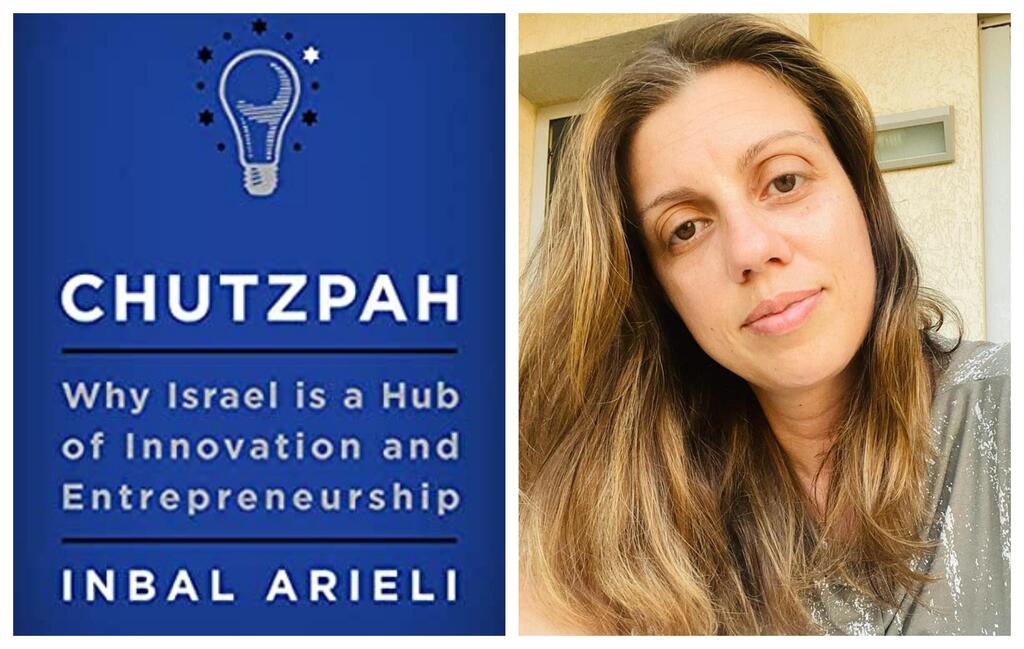
BiblioTech
CTech’s Book Review: The inherent traits that create Startup Nation
Hila Leizerovich, Co-Founder, CXO, and Director of Product Strategy at ThinkUp, shares insights after reading "Chutzpah: Why Israel Is a Hub of Innovation and Entrepreneurship” by Inbal Arieli
Hila Leizerovich is the Co-Founder, CXO, and Director of Product Strategy at ThinkUp, a business networking company helping fuel innovation and entrepreneurs. She has joined CTech to share a review of "Chutzpah: Why Israel Is a Hub of Innovation and Entrepreneurship” by Inbal Arieli.
Title: "Chutzpah: Why Israel Is a Hub of Innovation and Entrepreneurship”
Author: Inbal Arieli
Format: Book
Where: Home
1 View gallery


Hila Leizerovich, Co-Founder, CXO, and Director of Product Strategy at ThinkUp
(Photo: ThinkUp)
Summary:
Many wonder how a small country like Israel became Startup Nation. "Chutzpah" takes the readers on a journey through an Israeli childhood and shows how cultural habits and spirit encourage entrepreneurial thinking and behavior.
Instead of being an anecdotal story, Inbal Arieli leads us through the various startup phases and exposes how successful Israeli entrepreneurs made their way.
The book captures the critical element of being an entrepreneur. I was fascinated by the ambivalence I felt while reading about behaviors that most social norms try to reduce or moderate, but in "Chutzpah", they are the ‘secret sauce’ that turns into a powerful tool for Israeli entrepreneurs.
Important Themes:
Throughout the book, the author refers to five startup phases:
Discovery - An ‘aha!’ moment when you feel that different dots are connecting in a surprisingly new way. From a child and entrepreneur's point of view, it immediately creates a spark. The book creates a thinking axis between structured experience and exploring experience, and demonstrates how the chaotic-yard Israeli children play in is what equips them with essential entrepreneurial skills such as curiosity, risk management, independence, teamwork, etc. What can be considered low value and dangerous is actually the ‘dream yard.’
Validation - Having a clear need, and a solution is not enough to ensure success.
A startup should validate a feasible market and adjust the product and offering accordingly. It's crucial to put assumptions aside, open up and listen to customers' signals, and be ready for criticism and failure. Apparently, Israeli culture gives children a sense of capability and understanding that the things they do are not for themselves but for a more significant cause that will be accomplished through team effort. Failure is not something that defines me as an individual, but it's something that happened, and we should learn from it. In fact, when the ‘failure’ is detached from the individual capabilities, it helps to bounce back quickly. Once again, there's a metaphoric axis between the individual and the collective. All of the above creates flexible, resourceful, and collaborative children. And those are the same skill sets entrepreneurs need for the validation phase.
Efficiency - is when a startup needs to improve its offering, assess its strengths and weaknesses, and prove performance.
Most early-stage startups deal with limited resources and are required to be lean, smart, and resourceful. Entrepreneurs need to navigate uncertainty.
Coping with insecurity (thanks to Israel's geopolitical environment) develops a fast adaptation of DNA from a very young age. Living with unstable situations leads to a state of mind that ‘the show must go on…’
From an entrepreneurial point of view, it means:
- Making the best out of a difficult situation.
- Functioning well under pressure.
- Belonging: we're all working together under the same circumstances, which means you have a sense of belonging. Pressure connects people.
- Leading risk management.
- Improvising, leading by doing yourself, and being resilient.
I can really say that these factors characterize many Israeli entrepreneurs.
Growth & Stability - A startup that builds efficient processes and achieves a mechanism that works well is immediately expected to scale up its activity. Now, if we think about a moment that every Israeli is expected to step up, it's the military service.
On the positive side, you will find:
- Responsibility for the other and a mutual guarantee that creates a deeper relationship.
- Everyone is recruited based on skills and potential rather than knowledge and experience. The military allows soldiers to thrive.
- There is a healthy tension between hierarchy and informality since there are commands in the Israeli army, but soldiers address their superiors by their first name. In addition, everyone gets the same equipment but they start improvising to upgrade it to their needs. The nickname for that is "Shifzoor" (improvement and renovation).
This point could also sometimes become the Achilles' heel of Israeli entrepreneurs. A temporary solution that fits ‘here and now’ is not necessarily suitable for the long term. This stage is called Growth & Stability because entrepreneurs must see ahead and be prepared. Strategic planning at the foundation of a company is as crucial for ‘real-time’ management.
When the mindset is survival, everything becomes ‘a given situation.’
However, planning can anticipate all possibilities and analyze situations. This time, the axis ranges from strategic thinking to tactical thinking.
Regeneration - It's a phrase that means that a startup has solid resources, but the business environment changes, and companies should reinvent themselves to stand out, stay relevant and establish a better market grip.
The author emphasizes the main elements of this topic:
- Leverage of personal skills.
- Leverage of network and collaborations. In Israel, we connect and bond quickly.
Remember the individual-collective approach? Everyone is accessible; even on the other side of the world, we're bound to each other. It's all about networking, connections, working together, brainstorming, being ready to contribute, and open and warm relations.
If you're looking for a great global entrepreneurial example, search ICON - Israel Collaboration Network, based in Silicon Valley.
What I’ve Learned:
I’m glad to say that I've learned a lot.
I was exposed to many cultural differences. But mostly, I realized why investors make their choices based on the team.
A good team can be directed using best practices, methodologies, and networking.
Those will take anyone from A to B. But the entrepreneurial spirit and strong founding team that vouch for each other will take you all the way.
Who Should Read This Book:
You should read this book if:
You are interested in the Israeli entrepreneurial ecosystem; you're about to collaborate with an Israeli startup and wish to better understand the cultural background; and if you’re interested in the entrepreneurial spirit and how it can be impacted by cultural differences.













